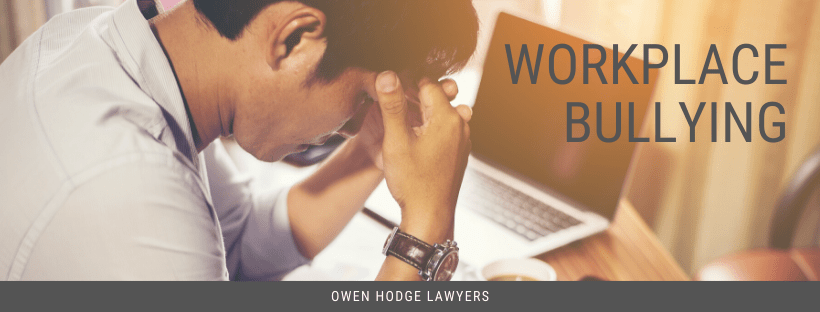Workplace bullying & harassment Law
In Australia, one of the employee’s workplace rights is to work in an environment that is free from workplace bullying and harassment.
Workplace harassment and bullying doesn’t just refer to management or employees in your workplace either, it can extend to clients, suppliers, independent contractors and anyone who has a relationship with your company. If you are a victim of workplace bullying or want to learn how you can manage it as an employer, speak to our workplace bullying lawyers.
What is workplace bullying in Australia?
Workplace bullying occurs when individuals or a group of individuals repeatedly behave unreasonably towards an employee/group of employees, and that behaviour creates a risk to health and workplace safety.
So what is considered employee abuse? Examples of bullying include:
- Teasing or practical jokes
- Spreading rude and/or inaccurate rumours
- Belittling and humiliating comments
- Aggressive behaviour
- Exclusion from work-related events
- Unreasonable work expectations
- Physical abuse
Employees may face workplace discrimination or harassment because of their gender, sexual orientation, race or religion, disability, age or martial status.
Learn more:
What is not workplace harassment?
Actions from your employer or employees that are carried out in a reasonable way, such as:
- Performance feedback
- Disciplinary action (carried out in a reasonable way)
- Directing and controlling the way work is carried out
If you’re in any doubt about what is appropriate behaviour, it’s always best to seek legal advice.
How to deal with workplace bullying
1. Keep a record
If you are experiencing workplace bullying, it is important to diarise what is happening. Write down when the incident(s) occurred and provide as much detail as possible, including the date it occurred and the names and addresses of people who witnessed the bullying. If possible, keep copies of any relevant documents. Diaries can be used as evidence in a tribunal or court.
2. Seek advice
It is also a good idea to seek information and advice from external government bodies or associations in your respective state or territory. However, they cannot provide legal advice. Employees should therefore obtain legal advice from qualified employment lawyers if they have specific questions about their employer’s obligations under the relevant Occupational Health and Safety legislation:
- Human Rights and Equal Opportunity Commission (HREOC)
- New South Wales Anti-Discrimination Board
- WorkCover NSW
- NSW Office of Industrial Relations
3. Make a formal or informal complaint
Approach your direct supervisor or someone you trust (such as a work safety representative or someone from human resources (HR)) to discuss the bullying and harassment in the workplace, or make a formal complaint and start the resolution process. If possible, you should try and resolve matters at an organisational level before seeking legal action.
4. Speak to the bully
After seeking advice, if you are able to, speak to the bully directly about their behaviour. This may be done with or without mediation depending on whether you have made a formal complaint. Sometimes the perpetrator is unaware of how their behaviour or words are making you feel and asking a person to assess their behaviour can put an end to it.
5. Proceed with legal action
If you’re being bullied at work and the matter cannot be dealt with through organisational processes, then legal options may be considered. If the bullying continues and your employer cannot or does not help, you can report the behaviour to:
- WorkCover NSW
- Office of Industrial Relations
- Anti-Discrimination Board
- NSW Police
- Any other relevant government body or union.
The type of workplace bullying will determine who you report the matter to. If it is a workplace health and safety issue, it falls under WorkCover NSW. For workplace discrimination or sexual harassment, refer your matter to the Anti-Discrimination Board and where there is violence or physical assault, the police should be consulted.
Unfair dismissal
If you are dismissed as a result of making a complaint, or feel that you had to resign because of the complaint, you may be entitled to lodge a claim under the Unfair Dismissal provisions of the Workplace Relations Act 1996. You may wish to seek legal advice from an unfair dismissal lawyer to help you through this process.
Learn more:
Speak to workplace harassment lawyers
If you’re dealing with bullying in the workplace (NSW), speak to our experienced team of employment lawyers. We are able to advise you, help you stop the bullying behaviours and pursue legal action if needed. Our commitment is always to our client, so please contact our employment lawyers during business hours on 1800 770 780.
Here at Owen Hodge Lawyers, we are always striving to deliver the legal advice and guidance you need. Read our recent post about the social media used as evidence in court and more on the Owen Hodge blog today!
Employment Lawyers
Frequently asked questions
The short answer is – it depends. Continuously being yelled at all day long in the workplace can be considered harassment, but one or two loud words against another co-worker may not be. It also depends what is being yelled – if it is an abusive word then that obviously furthers the case of this being harassment.
Abuse of power is when someone in power uses their authority to commit unlawful acts or for personal gain. This abuse can include sexual and physical abuse, as well as negligence.
To prove a hostile work environment, you need to show the following:
- The behaviour lasts over time and is not investigated
- The hostility disrupts an employee’s work and/or career progress
- The actions or behaviours must discriminate against a protected classification such as age, religion, disability or race.
- The hostile behaviour, actions and communications are severe

